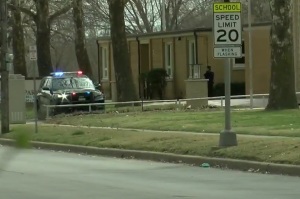ACLU, ADF Lawyers Debate Gay Wedding Cakes in Mock Supreme Court Hearing

Lawyers from the American Civil Liberties Union and the Alliance Defending Freedom squared off in a debate Monday night, offering the American public a sample of what to expect next month as the United States Supreme Court hears a Colorado Christian baker's appeal seeking the right to refuse to bake gay wedding cakes.
At a moot court debate hosted at the Newseum in Washington, D.C., ADF senior counsel David Cortman and ACLU staff attorney Ria Tabacco Mar argued before a diverse panel of four Supreme Court journalists about whether or not Christian baker Jack Phillips of Masterpiece Cakeshop had the religious freedom right to refuse to bake a cake for the same-sex wedding of Charlie Craig and David Mullins in 2012.
While lower courts have ruled that Phillips violated Colorado's non-discrimination law that prevents discrimination on the basis of sexual orientation among other classes, Cortman argued that his client did not refuse to bake the cake on the basis that the couple was gay but rather that it would force Phillips to violate his religious convictions by participating in an inherently sacred ceremony that violates traditional Christian teachings.
Cortman pointed out that Phillips also declines to bake other types of cakes that might violate his faith like Halloween cakes or cakes with anti-family themes.
"Yet, the double standard in enforcing this law is exemplified in this case. The same court that ordered Jack to promote a view of marriage that he disagrees with has found three other cakeshop owners not to have violated the same exact law because they refused a Christian man's request opposing same-sex marriage on religious grounds," Cortman said.
"The reason given by the commission was that the refusal was not based on his characteristic of being religious, which protects broadly his manner of beliefs, but rather was based on his refusal not to [create] a message opposing same-sex marriage. Even though [Jack] declined for the same reasons, his justification was rejected."
"This inconsistent application of law is not only based on the content of the message, but it also favors people with one particular view, both of which this court has found unconstitutional," Cortman added. "This court has also held that compelling speech violates the First Amendment. In fact, the lower court's order that is up on review only worsens the compelled speech at issue here."
Mar, who argued that the government's compelling interest to limit discrimination justifies infringing on First Amendment rights, was asked by the panel whether there is ever an instance in which cake can depict speech.
"I don't think it matters whether or not we think of the cake as speech. What we do is we look at the anti-discrimination act and we say, 'Is this a law that is targeting speech or expression or is instead a law that is regulating something else?' In this case, it is commercial conduct when you are involved in sales to the general public," Mar contended.
"It doesn't matter what the substance is or the product that is sold. It could be books, it could be newspapers, it could be fine art, any of those things. If you choose to make it available to the public at large, you can't discriminate based on those characteristics that have been enumerated."
Mar reasoned that since Phillips offers custom wedding cakes to the public he should also be forced to offer custom wedding cakes to gay couples.
Cortman responded by stating that Mar made a "concession" in her response that the government is in fact compelling speech.
"Let me go back to the concession just made by the respondents because I don't want that to be overlooked. That's an incredible concession. What she basically just argued before this court that, even if it is speech, that the government can compel it," Cortman stressed. "There is no case from this court that has ever held in any context — even the non-discrimination laws, even accommodation laws — that the government can compel speech."
"In fact Hurley [v. Irish American Gay, Lesbian, and Bisexual Group of Boston], was exactly this case, where they said, 'No, this is sexual orientation discrimination under a public accommodation law.' The court said, 'Not so fast, you are compelling speech and you are changing the message of the speaker and it struck down the application of the speaker,'" Cortman continued.
"That's exactly what is going on here. There is no case. In fact, there are half-a-dozen cases or more where the Supreme Court has held that if you compel speech, even if it is to a neutral law like this, that it strikes at the heart of the First Amendment.":
Cortman stated that the concession can't be overlooked and argued that just because a baker sells cakes doesn't mean he loses his First Amendment protections.
Cortman was asked if the 1995 Hurley case, which deals with a gay rights group's right to march in a Boston St. Patrick's Day parade, can be truly be applied to Phillips' case since the court found that the parade was essentially a private event.
"It was a private event but it was found to be a public accommodation by the state, which is exactly what was found here. It didn't turn on the fact it was private versus public because the court didn't overrule the fact that it was a public accommodation," Cortman responded. "In fact, it was said even if it is a public accommodation, we have to draw the line at this application of the law. So, we have to keep in mind that no one is challenging the fact that public accommodation laws exist, it is when you apply them too far to restrict speech or compel speech, which is what the court found in Hurley, that it was unconstitutional to do so."
Mar cited the case of United States v. O'Brien, in which the Supreme Court ruled against a man's right to burn his draft card in protest of the Vietnam War, to state that the Supreme Court has ruled in the past that speech can be restricted by the government.
"It was a law that was aimed at maintaining the government's ability to administer the draft. Because of that, the court upheld Mr. O'Brien's conviction for what was undoubtedly very expressive conduct," she stated. "So, even if the conduct of selling a wedding cake when you have chosen to open your doors to the public at-large could be found to express a message in the same way that burning a draft card on the steps of a courthouse can, it still can be regulated consistent with the First Amendment."





























